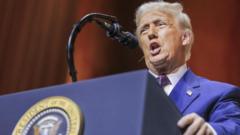Following the announcement of steep tariffs by the U.S. on Canadian imports, Canadians have publicly expressed their discontent, leading to calls for a 'buy local' movement and potential economic ramifications for both countries.
Canadian Response Intensifies as Tariffs Spark National Sentiment Shift

Canadian Response Intensifies as Tariffs Spark National Sentiment Shift
The imposition of tariffs by the U.S. has led to a wave of Canadian backlash, demonstrating a growing sentiment of nationalism amidst economic uncertainty.
As the U.S. prepares to impose significant tariffs on Canadian imports, the reaction from Canadian citizens has been swift and vocal. At recent sporting events in Ottawa and Toronto, fans have notably booed the U.S. national anthem, signaling widespread frustration with U.S. President Donald Trump's protectionist policies. These tariffs—their impact extending to a vast array of everyday products—have raised concerns and sowed division midway through the delicate trade relationship critical to both nations.
The new trade barriers, including a 25% tariff on imports from Canada alongside a reduced 10% on energy, take effect imminently. This development has raised fears in Canada of potential economic fallout, projecting worries of a looming recession should these measures persist. Prominent Canadian leaders, including Prime Minister Justin Trudeau, have urged solidarity among Canadians during these challenging times, invoking national pride and encouraging citizens to patronize local products.
Public outcry against the tariffs has quickly turned into actionable responses from the Canadian populace, exemplified by initiatives circulating on social media instructing consumers on how to avoid purchasing American goods. In Ontario, the most populous province, a temporary ban on American alcoholic beverages has already been implemented, and discussions around boycotting travel to the U.S. have gained traction.
Historically, Canada and the U.S. have shared a strong alliance, supported by military collaboration in various global conflicts. Canadian citizens are now questioning the integrity of this partnership, as irritation towards U.S. policies grows. Economists are concerned that prolonged tariffs could burden American consumers with increased prices, affecting essential goods like food and fuel while primarily harming the Canadian economy.
Political leaders are vocal about their criticism of the tariffs, with opposition figures labeling them as "massive, unjust, and unjustified." They emphasize the longstanding connections between the two nations and argue that targeting Canada undermines the alliance forged through shared sacrifice and cooperation.
Experts remark that these tariffs signify a shift in Canadian-U.S. relations, marking a difficult chapter for both nations, while also urging Canada to diversify its trade partnerships beyond its borders. Nonetheless, geographical realities will continue to bind Canada closely to the U.S. and maintain its status as a crucial trade partner.
In summary, this trade dispute reflects not only economic tensions but also a growing sentiment among Canadians to assert their national identity amid external pressure. As Canada prepares for a challenging economic climate, it remains to be seen how this confrontation will evolve in both short- and long-term contexts. While Trump's administration has expressed aims to alleviate domestic concerns regarding illegal imports and trade deficits, the repercussions of this tariff strategy could reshape the course of U.S.-Canada relations for the foreseeable future.
The new trade barriers, including a 25% tariff on imports from Canada alongside a reduced 10% on energy, take effect imminently. This development has raised fears in Canada of potential economic fallout, projecting worries of a looming recession should these measures persist. Prominent Canadian leaders, including Prime Minister Justin Trudeau, have urged solidarity among Canadians during these challenging times, invoking national pride and encouraging citizens to patronize local products.
Public outcry against the tariffs has quickly turned into actionable responses from the Canadian populace, exemplified by initiatives circulating on social media instructing consumers on how to avoid purchasing American goods. In Ontario, the most populous province, a temporary ban on American alcoholic beverages has already been implemented, and discussions around boycotting travel to the U.S. have gained traction.
Historically, Canada and the U.S. have shared a strong alliance, supported by military collaboration in various global conflicts. Canadian citizens are now questioning the integrity of this partnership, as irritation towards U.S. policies grows. Economists are concerned that prolonged tariffs could burden American consumers with increased prices, affecting essential goods like food and fuel while primarily harming the Canadian economy.
Political leaders are vocal about their criticism of the tariffs, with opposition figures labeling them as "massive, unjust, and unjustified." They emphasize the longstanding connections between the two nations and argue that targeting Canada undermines the alliance forged through shared sacrifice and cooperation.
Experts remark that these tariffs signify a shift in Canadian-U.S. relations, marking a difficult chapter for both nations, while also urging Canada to diversify its trade partnerships beyond its borders. Nonetheless, geographical realities will continue to bind Canada closely to the U.S. and maintain its status as a crucial trade partner.
In summary, this trade dispute reflects not only economic tensions but also a growing sentiment among Canadians to assert their national identity amid external pressure. As Canada prepares for a challenging economic climate, it remains to be seen how this confrontation will evolve in both short- and long-term contexts. While Trump's administration has expressed aims to alleviate domestic concerns regarding illegal imports and trade deficits, the repercussions of this tariff strategy could reshape the course of U.S.-Canada relations for the foreseeable future.





















